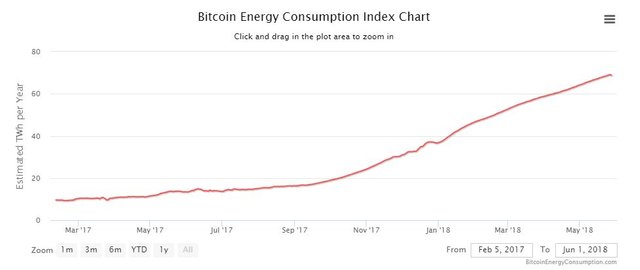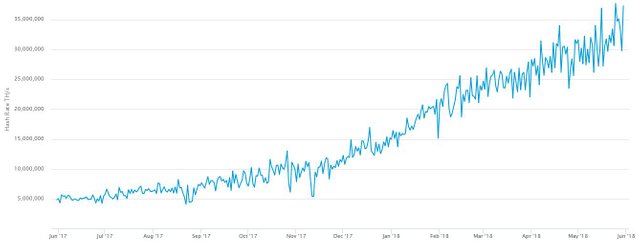Scottish rehabilitation center treats cryptocurrency addiction / Why the high power consumption of Bitcoin is probably not a problem for the environment

Enthusiasm is great, but can also turn into addiction. Christopher Burn, probably the world's first therapist for cryptocurrency addiction, tells in an interview how to recognize the new disease and how to treat it.
Do you know that? You log in to seven crypto exchanges every day and update Coinmarketcap, Reddit, Coinforum, Twitter, and other info sources about Bitcoin and Co. every ten seconds. Once you're not connected to the Internet, if only because you're taking a shower and think of missing something; and even before you have dried yourself, you grab your smartphone quickly ...
If you do not just know it, but experience it every day, you might be suffering from Bitcoin or cryptocurrency addiction. The Scottish rehabilitation center "Castle Craig Hospital" recently added this disease to its treatment program. Thus, the medicine sector confirms what especially some partners of crypto-junkies already suspect - that Bitcoin is neither a money nor a store of value, but a strong addiction.

Kindly, Christopher Burn, the lead therapist at the clinic's crypto department, gave an interview and answered ten questions. He joined Castle Craig in 1988 as Financial Director and retrained as a therapist in 1994. Chris formerly trained and worked as a Chartered Accountant in London, Paris and Malta and ran a small hotel in the Scottish Borders.

On your website you call cryptocurrency addiction a "modern epidemic". How many people are affected?
We have no information on how many people are addicted to cryptocurrency trading.
At what symptoms can one recognize a cryptocurrency addiction?
Typical symptoms are:
You spend a great deal of time on activities related to the trading of cryptocurrencies. To check the price, think about how to act. Other occupations, such as work, social interaction or sport are neglected.
Debt and financial problems
Lies to friends and family members about your own activities
Fluctuating moods, the feeling of hopelessness and depression
Fear expressed in physical symptoms such as sweating or shivering
Unrealistic views, such as being happy or ignoring losses
Try to control the activities, but to no avail
Are there different levels of cryptocurrency addiction?
Probably. But as soon as negative consequences, no matter what, occur, the problem should be recognized and treated before it gets worse.
How does the addiction go if left untreated?
As with most forms of gambling, a first-time profit is likely to turn into losses. This initially causes trouble and leads to an attempt to offset the losses by more games. This is followed by a period of despair, because such attempts have exacerbated the problem, which in the end leads to complete despair and possibly even suicide.
How can you help yourself when you feel addicted?
One should seek help, either from professional addiction counselors or self-help organizations, such as the anonymous gambler. If you think you have a problem, you probably have one too.
What should be done if the friend or husband is infected with the addiction?
You can not compromise with the addict. Any kind of help, such as paying debts, only allows the person concerned to continue the dependency, which is likely to have even more drastic consequences. Saying 'no' can be difficult, but it is important. This is called 'severe love'.
When do you need the help of a doctor or therapist?
Medical help should be sought without hesitation when a person's physical and mental status gives a reason to raise the alarm: for example, when gambling addiction becomes depression, suicidal thoughts appear, or signs of extreme physical stress, such as sweating or shaking, and so on continue.
How do you treat people with a cryptocurrency addiction?
At Castle Craig Hospital, we consider all forms of dependency a disease that can never be completely cured. However, one can achieve relief and liberation. In this regard, cryptocurrency acts like any other addiction. It can reappear any time - but if the person concerned stays consistent and follows a particular program, such as Castle Craig's, he can live happily and free from addictions.

Living room at Craig Castle.
Will an addict ever be able to read news about cryptocurrencies without running the risk of relapsing back?
I would not say 'never again', but any kind of addiction is potentially life-threatening when it's active and therefore those who have recovered from it should be careful and avoid risks. We recommend that you do not challenge yourself. Why? Why should one read or otherwise be related to an activity that is known to drive one into suicide?
How many patients with a cryptocurrency addiction do you have?
25 percent of our patients suffer from a form of gambling addiction. Some of them have also participated in cryptocurrency trading. It is rare for a patient to be addicted to cryptocurrency trading (we have had one), but requests from potential patients for this form of gambling addiction are increasing.
Bonus Question: Can you pay for the treatment at Castle Craig Hospital with Bitcoins?
No

Yes, Bitcoin uses a lot of electricity. But this does not mean that the cryptocurrency is destroying the climate. Because the ecological footprint of Bitcoin should be much smaller than you think at first glance.
Recently, economist Alex de Vries has published a paper on "Bitcoin's Growing Energy Problem" in the journal Joule. Vries, who works for the consulting firm PricewaterhouseCoopers, has been working on Bitcoin power consumption for some time. On his website Digiconomist he presents this with the Bitcoin Energy Consumption Index.
According to Vries Paper, bitcoin miners currently consume at least 2.55 gigawatts, but are more likely to consume about 7.67 gigawatts. This would allow Bitcoin to consume almost as much electricity as Austria (8.2 gigawatts). This value is of course a scandal that finds an echo in the German media. For example, T3N, Zeit or the Süddeutsche Zeitung reported on the paper. Spiegel Online brings an interview with de Vries, in which he even calls for "an international agreement, preferably under the leadership of the UN" to manage the energy consumption of the mining.
Is it really that bad with the mining? How reliable are the values of de Vries? Is Bitcoin threatening to destroy the success of the energy revolution, as the Spiegel asked at the end of 2017? Or is the reality a bit more complicated?
In the following I will try to bring some clarity to these questions.
No matter how you calculate it - it's a lot
Let's start with how to measure Bitcoin's power consumption. The vast majority of power consumption goes back to the miners competing to attach a new block to the blockchain. How much they consume is hard to find out.
We know how high Bitcoin's Hashrate is - about 35 million terahash, which means that all miners together make about 35 trillion hashes per second. But we do not know with which devices they are produced. Is it the modern, energy-efficient Antminer S9? What is the contribution of miners to the older generation? Are graphics cards still connected? The power consumption depends extremely on which devices are used. And we do not know that.
The estimated number of tera hashes per second (trillions of hashes per second) the Bitcoin network is performing.
If you start with the Hashrate, you can at best calculate a minimum value: You take a current miner - the Antminer S9 - and pretend that the entire mining network consists exclusively of it. An S9 generates 13 Terahash with a power consumption of 1300 watts. That would take around 2.7 million Antminer S9 to apply the bitcoin hashrates, giving us 3.5 gigawatts of power. This would be, as we have said, a lower bound that can be multiplied by any estimate (x1,5; x2; ...).
De Vries starts his estimation at the other end: In the income. He assumes that the miners will produce hash power until they make only a marginal profit. Then he estimates how much money they invest in mining, which part of it goes into electricity, and what prices the miners pay. He assumes a share of electricity of 60 percent and an electricity price of 5 US cents per kilowatt hour.
With these values, Vries comes to the conclusion that Bitcoin consumes at least 2.55, but probably rather 7.67 gigawatts. The Bitcoin Energy Consumption Index on its website translates this value (7.67 gigawatts) into an annual consumption of 69 terawatt hours. That's about as much as six to eight decent nuclear power plants produce and consume more than the country's Czech Republic.
Of course you can doubt Vries method. However, as we have seen, even an optimistic minimum estimate is due to the power consumption of the Antminer S9 at 3.5 gigawatts. This makes it relatively likely that Vries' values are relatively correct. What is often radically wrong, however, is the interpretation of this result.
Cheap electricity is usually green electricity
At first glance, that does not sound good. We replace incandescent bulbs with LED lights, build refrigerators and washing machines that use less and less electricity, and set up thousands of wind turbines - and then Bitcoin comes in, consuming 69 terawatt hours a year. Does the cryptocurrency ruin everything? Was the energy turnaround and all the energy saving in vain?
Such questions are obvious, but they are wrong because they compare things that you can not compare. Because there is no direct relationship between the amount of electricity produced and the ecological footprint.
A simple comparison: Living in the vicinity of coal-fired power plants will pollute the environment every kilowatt-hour consumed. If he lights up an LED lamp for an hour a day, he will do more damage to the environment than if someone was wasting renewable energy, such as when the Icelandic capital Reykjavik heats their sidewalks with geothermal energy in winter. It does not depend on how much, but on what. It is better to waste electricity from renewable sources than to save electricity from coal.
Of course, with Bitcoin, we do not know where the miners are and what their power is. The only thing we know is that the miners go where the power is cheap. While other industries are more localized and dependent on a mix of cost factors, miners are highly mobile and see power costs as by far the most important competitive factor. There should be no industry that is so attracted by low electricity prices.
According to Statista, countries with surprisingly low electricity costs are Sweden, Finland and Canada. These three countries have in common that they have a relatively high share of renewable energy, primarily hydropower. In Canada, according to a study by the Fraunhofer Institute, electricity prices in the province of Quebec are lowest. Quebec has one of the world's highest shares of hydropower - and is considered a miners' paradise.
Similarly in Sweden, Norway, Finland, the US and, above all, Iceland: electricity is most favorable where it can be produced most easily and with a surplus. This usually does not mean building a coal or nuclear power plant - both of which are usually only competitive with government subsidies, if one adds the follow-up costs - but using the natural conditions to harness energy. This is true even for Germany, where wind power is now the cheapest way to create new power capacity. Hydropower and geothermal energy are, of course, much cheaper on an international basis, which is why it is likely that most of Bitcoin's hash rate comes from these environmentally friendly forms of energy.
At this point, it would be possible to express a not entirely absurd supposition: that Bitcoin's biological footprint, despite its enormous energy consumption, is better than that of a Rhenish industrial area. Because the German electricity is often not only expensive but also dirty.
Cheap coal power as a result of the wrong policy
We stick to this argument, but let it go in a different direction.
The Bitcoin miners inevitably settle in locations where electricity is cheap. Any kind of electricity that is sold at prices below 5 or 6 dollar cents is suitable for miners. In most cases, such electricity comes from hydropower or geothermal energy, as this energy can be generated and scaled in a relatively simple and convenient way, provided the natural conditions are met. In many northern countries or provinces there is an excess of clean energy that is mined by the miners. The ecological footprint of such mining farms is zero. An LED light in a South German household causes more damage.
The coal power plant at Weisweiler:

If mining is worthwhile, it means that there is an oversupply of electricity in a region: that a producer is willing and able to produce more electricity than citizens and businesses consume. It means that a region either produces a lot of electricity but does not have any industries consuming it - such as Iceland or Quebec in Canada - or that the industry is idle in that area, such as the so-called Rust Belt in the Northeastern United States, but the energy technology infrastructure has not been sufficiently dismantled.
In most cases, waste takes place before the miners settle. Should there actually be a nuclear power plant or coal-fired power plant that works without there being a need to drive electricity prices to a mining-prohibitive level, this in itself is likely to be an ecological scandal. If a government nowadays expands or maintains non-renewable energy producers for which the market has no need, then it sets serious economic-ecological disincentives. These are exploited by miners, but usually corrected relatively quickly.
For example, Venezuela subsidized electricity production to the extent that it had the cheapest tariffs in the world. This attracted scores of miners, some of whom have generated bitcoins profitably with old - ie extremely inefficient - devices. As a result, the electricity became increasingly scarce locally, and when a mining farm once even caused a blackout in a whole neighborhood, the government intervened and closed the farm.
Similarly in China, where miners had spread to wherever the government's planned economy provided abundant power for new industrial sites. In part, the miners smelt the fruits of planning mistakes, such as setting up their Asic farms in ghost towns with large power plants, but in some cases they were also draining power needed by other industries. As soon as the miners come into conflict with the power hungry of the "real" industry, the government intervenes here as well. As a result, more and more Chinese miners are moving their machines to places where renewable electricity is cheap and surplus in abundance.
Under normal circumstances, maladministration usually corrects itself. Sometimes, however, it happens that a region or government creates or maintains overcapacity from coal or nuclear power. In this case, in the worst case scenario, miners prevent such overcapacity from being reversed due to lack of demand.
Such maladministration is pretty easy to do away with. The government only has to do what it takes for a modern, ecologically oriented energy policy to understand itself: make sure that electricity from non-sustainable production is more expensive than renewable energy. If that were the standard, bitcoin mining could not be harmful to the environment at all.
Video Source:
Image Sources:
- Article headers created by myself
- https://castlecraig.co.uk/
- https://digiconomist.net/bitcoin-energy-consumption
- https://blockchain.info/charts/hash-rate
- http://www.staedte-fotos.de

Have a nice day!
LOVE&LIGHT



wrote of this 3 days ago ;)
https://steemit.com/bitcoin/@kingscrown/addicted-to-crypto-trading-visit-scotland-bonuses
You are so right in your post the funny thing is a few days back I told my brother to add a few cryptos as payment method in his company it will give him free advertisement and will help cryptos as well :)
maybe i am addicted .but its addiction that i don't want to treat or leave it :)
You received a 26.09% upvote from @brotherhood thanks to @liquidcrypto!,

join on @brotherhood community on discord channel:https://discord.gg/3HZdaGk and share your post there.
Delegate to Bot and Get High Return Fix 100% earning return,
bidders will always win something and it will adapt to distribute all the 100% upvote ,now we reached to 13000 SP and recommend. send the 0.15 to 0.4 sbd or steem.
Very interesting post. Its good that someone somewhere decided to give a name to this disease and have a treatment for it. But not everyone would willingly admit they are addicted. Even if they do, this kind of treatment is not available everywhere.
i can imagine they will be very busy in few years
great stuff
I just created my account a few minutes ago and don't really know how this whole thing works yet, but I had to leave a comment on your post not only because it is totally awesome, but it's the first post that I came across as well. I always joke how I am a total crypto fien, I have a degree in psychology and have a background working with people who suffer from addiction, so this doesn't surprise me at all. I do think it's interesting that they are classifying it as a separate disease instead of just categorizing it under "gambling addiction." Common sense would tell me that gambling is gambling is gambling; however, I can see some wanting to break it down into its own niche just like alcoholics consider that to be different than a drug addict.
Honestly, anything can become an addiction, whether it is good or bad for you. I am a total fitness freak, however working out is great for you, so people don't view that as a problem. If you have an addictive personality you can pretty much become addicted to anything.
I know for me; personally, I tend to overdo anything that I get involved with. That is just my nature. I am tempted to go to an AA meeting and introduce myself as, "I am Dominique, and I am a crpytoholic hahaha.
Thanks for the great post and I look forward to reading more of your stuff!
Welcome to Steemit and thank you for this very nice comment I am sure if you keep writing comments like this one you will get a lot of new friends very fast. I am following you now and I am looking forward to see some posts of you.
Have a nice day and a awesome weekend c ya soon (:
When I first started investing in crypto I was spending all day, every day, watching to charts. I was so stressed that I had to balance myself by smoking weed all of the time. I became reclusive, ignored my friendships and my health decreased. It was not good.... I can totally see how people could develop a crypto addiction. Glad to see there are people working to help those in need
Posted using Partiko Android
This post I can relate very well with. I confuse I am an addict to cryptocurrency. Since I started learning crypto last August things have change significant for me.
It feels real real bad right now for me but mentally I try to stay positive and collect my pieces of life and try to put something decent together to call a life worth living.
I would have never thought the things that happened to me recently would be because of crypto but here I am having to deal with it.
Hopefully this gets out more and help others avoid pitfalls of cryptos. Thanks.
It seems to me like Proof of Work is better since it is more energy efficient and you can do more with it.
Agree, but the cost of mining must help give Bitcoin more of a price floor. I'm more confident in the current price knowing those mining it have invested a lot to get it.
For now. Ethereum is gaining ground and I guess going to switch to POW. If Bitcoin ever does collapse in prices the miners might shut down which could be the demise of Bitcoin.
Thanks for the upvote. I'd upvote your reply but there is a .02 payout threshold. If you ever get some more SBD you might want to sign up for @dustsweeper.
Agree, but the cost of mining must help give Bitcoin more of a price floor. I'm more confident in the current price knowing those mining it have invested a lot to get it.